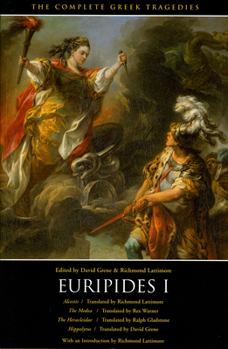Medea and Other Plays
Select Format
Select Condition 
Book Overview
Euripides I contains the plays "Alcestis," translated by Richmond Lattimore; "Medea," translated by Oliver Taplin; "The Children of Heracles," translated by Mark Griffith; and "Hippolytus," translated... This description may be from another edition of this product.
Format:Paperback
Language:English
ISBN:0226307808
ISBN13:9780226307800
Release Date:February 1955
Publisher:University of Chicago Press
Length:232 Pages
Weight:0.56 lbs.
Dimensions:1.0" x 5.3" x 8.1"
Customer Reviews
5 ratings
Good job
Published by Thriftbooks.com User , 15 years ago
Very fast shipping ! I didn't expect it to come so quickly with standard international shipping. Besides, the book is brand new as described on the site. I am very pleased, thanks.
Classic Vellacott
Published by Thriftbooks.com User , 15 years ago
Philip Vellacott's translations of any Greek play remains for me the epitome of a translators art. Really it's thanks to Vellacott that Euripides became famous in our day! These translations will never die.
Great Collection
Published by Thriftbooks.com User , 20 years ago
I think this is one of the better compilations I've seen. I've really been impressed with all of the Oxford World's Classics series. The information given in the Introduction as well as the maps and reference materials mentioned are very helpful. In addition I like having the notes listed at the end of the compilation rather then interspersed, I find it less distracting that way. A must have for any Greek Literature Scholar.
Disturbing View of the Irrational
Published by Thriftbooks.com User , 23 years ago
Euripides is the dramatist of the irrational. His greatest work, The Bacchae, Medea, Hippolytus, depicts a world in which irrational passions are a powerful and destructive force. In contrast to Aeschylus, whose greatest work - The House of Atreus trilogy - describes the harnessing of irrational forces into civic fabric of the polis and rationalistic worship of the Olympian pantheon, Euripides sees the passions as uncontrollable. Some of the gods, such as Dionysius in The Bacchae and Aphrodite in Hippolytus, appear as the personfication of destructive passions. Many of the human figures in Euripides plays appear unable not only to face the force of these passions, but also unable to recognize the danger represented by the passions. Euripides view is dark but powerful and his works are compelling but dispiriting. The Penguin series of his plays includes translations by Phillip Vellacott. Though most of these translations were produced decades ago, they retain their freshness and immediacy. This set of inexpensive books is an excellent way to experience Euripides.
Terrific translations and commentaries on four plays.
Published by Thriftbooks.com User , 25 years ago
Vellacott has provided excellent translations and commentaries on four of the plays of Euripedes, including his classic "Medea." They should be required reading of any college student. "Medea" is a study in how unbridled passion can overcome reason and lead to tragedy. This may be particularly pertinent with respect to the ongoing war between Athens and Sparta at the time the play was first presented. Medea, who had helped Jason in his quest, become his wife, and given him two sons, feels betrayed since he is marrying the daughter of the ruler of Corinth. With horrible vengence, she kills the bride and the king and then her two sons. "Hecabe" is a play about the wife of Priam, King of Troy, and the mother of Hector, Paris, Cassandra, and others. At the start of this play, the war between the Greeks and Troy is over and Hecabe is now a slave of Agamemnon. The ghost of Achilles had appeared and demanded a sacrifice over his tomb before the Greeks can set sail for home. They vote to sacrifice Polyxena, Hecabe's young daughter, despite the tears and entreaties of Hecabe. After Polyxena's noble death, Hecabe learns that her last child Polydorus had been murdered by the King of Thrace, Polymestor, to whom Polydorus had been sent for safekeeping. This finally drives Hecabe mad and she seeks vengence for Polydorus's death. Euripedes shows in this play the effects of war and vengence on innocent lives and how cruel men at war can be. "Electra" is another retelling of the vengence story of Electra and Orestes. In this version, they are less heroic and more realistic then the way they are portrayed by Aeschylus and Sophocles. Interestingly, the one true noble and honest character in the play is the peasant husband of Electra, who refuses to tough her because he is beneath her station. Was Euripedes making a social comment about the upper classes of Athens of his time? The final play is "Heracles." In this play, the wife of Heracles, his three young sons, and Heracles' father Amphitryon are in danger of being killed by the usurping king of Thebes, Lycus. Lycus wishes them dead since he had killed Megara's father, King Creon, and taken his throne and Lycus doesn't want the three sons to grow up to avenge the death of their grandfather. Heracles is believed by many to be dead. But, he returns in time to thwart and kill Lycus. Unfortunately, the goddess Hera, who has always had a hatred of Heracles, sends the minor goddess Madness down to drive Heracles temporarily insane. In his fits, he kills his wife and sons. When sanity returns to him, he realizes what he has done and how immoral the gods are. The Greek gods are not an acceptable standard for moral behavior. Man can serve as a standard, and this is exemplified in the play by Theseus, ruler of Athens.
Medea and Other Plays Mentions in Our Blog

Pause and Call Them 'Blessed'
Published by William Shelton • May 13, 2023
Motherhood is a complicated role, and every culture from the dawn of man has placed the burden of great expectations on mothers. How fitting, right, and proper it is that we pause annually to rise up and call 'blessed' those women who brought us into being through pain, tears, and toil.






